Biography of Ophelia
Pepy's Diary. 13 Feb 1661. At the office all the morning; dined at home, and poor Mr. Wood with me, who after dinner would have borrowed money of me, but I would lend none. Then to Whitehall by coach with Sir W. Pen (age 39), where we did very little business, and so back to Mr. Rawlinson's (age 47), where I took him and gave him a cup of wine, he having formerly known Mr. Rawlinson (age 47), and here I met my uncle Wight, and he drank with us, and with him to Sir W. Batten's (age 60), whither I sent for my wife, and we chose Valentines' against to-morrow1, my wife chose me, which did much please me; my Lady Batten Sir W. Pen (age 39), &c. Here we sat late, and so home to bed, having got my Lady Batten to give me a spoonful of honey for my cold.
Note 1. The observation of St. Valentine's day is very ancient in this country. Shakespeare makes Ophelia sing "To-morrow is Saint Valentine's day, All in the morning betime, And I a maid at your window To be your Valentine". Hamlet, act iv. sc. 5.-M. B.
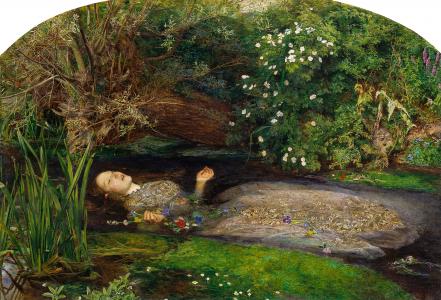 1851 to 1852. John Everett Millais 1st Baronet (age 21). "Ophelia". Hamlet Act IV Scene 7 Part IV in which Queen Gertrude describes Ophelia's death to Laertes. Millais painted the scene near Tolworth, Surrey [Map] using the River Hogsmill. Elizabeth Siddal (age 21) modelled in a bath-tub at 7 Gower Street, Camden [Map]. The initials PRB bottom right next to his signature.
1851 to 1852. John Everett Millais 1st Baronet (age 21). "Ophelia". Hamlet Act IV Scene 7 Part IV in which Queen Gertrude describes Ophelia's death to Laertes. Millais painted the scene near Tolworth, Surrey [Map] using the River Hogsmill. Elizabeth Siddal (age 21) modelled in a bath-tub at 7 Gower Street, Camden [Map]. The initials PRB bottom right next to his signature.
 1852. Arthur Hughes (age 19). "Ophelia".
1852. Arthur Hughes (age 19). "Ophelia".
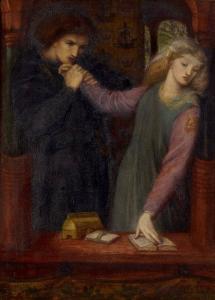 1866. Dante Gabriel Rossetti (age 37). Watercolour "Hamlet and Ophelia".
1866. Dante Gabriel Rossetti (age 37). Watercolour "Hamlet and Ophelia".
 1874. William Quiller Orchardson (age 41). "Ophelia".
1874. William Quiller Orchardson (age 41). "Ophelia".
 1883. Alexandre Cabanel (age 59). "Ophelia".
1883. Alexandre Cabanel (age 59). "Ophelia".
 1889. John William Waterhouse (age 39). "Ophelia".
1889. John William Waterhouse (age 39). "Ophelia".
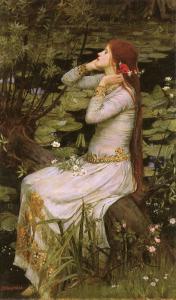 1894. John William Waterhouse (age 44). "Ophelia".
1894. John William Waterhouse (age 44). "Ophelia".
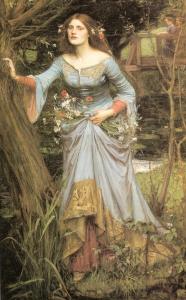 1910. John William Waterhouse (age 60). "Ophelia".
1910. John William Waterhouse (age 60). "Ophelia".
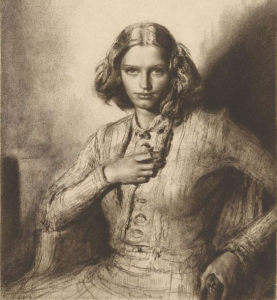 1942. Gerald Leslie Brockhurst (age 51). "Ophelia". Portrait of Kathleen Woodward (age 29).
1942. Gerald Leslie Brockhurst (age 51). "Ophelia". Portrait of Kathleen Woodward (age 29).
Hamlet Act IV Scene 7 Part IV. [Enter Queen.]
How now, sweet queen?
Gertrude. One woe doth tread upon another's heel,
So fast they follow. Your sister's drown'd, Laertes.
Laertes. Drown'd! O, where?
Gertrude. There is a willow grows aslant a brook,
That shows his hoar leaves in the glassy stream.
There with fantastic garlands did she come
Of crowflowers, nettles, daisies, and long purples,
That liberal shepherds give a grosser name,
But our cold maids do dead men's fingers call them.
There on the pendant boughs her coronet weeds
Clamb'ring to hang, an envious sliver broke,
When down her weedy trophies and herself
Fell in the weeping brook. Her clothes spread wide
And, mermaid-like, awhile they bore her up;
Which time she chaunted snatches of old tunes,
As one incapable of her own distress,
Or like a creature native and indued
Unto that element; but long it could not be
Till that her garments, heavy with their drink,
Pull'd the poor wretch from her melodious lay
To muddy death.
Laertes. Alas, then she is drown'd?
Gertrude. Drown'd, drown'd.
Laertes. Too much of water hast thou, poor Ophelia,
And therefore I forbid my tears; but yet
It is our trick; nature her custom holds,
Let shame say what it will. When these are gone,
The woman will be out. Adieu, my lord.
I have a speech of fire, that fain would blaze
But that this folly douts it. Exit.
Claudius. Let's follow, Gertrude.
How much I had to do to calm his rage I
Now fear I this will give it start again;
Therefore let's follow.
Exeunt.